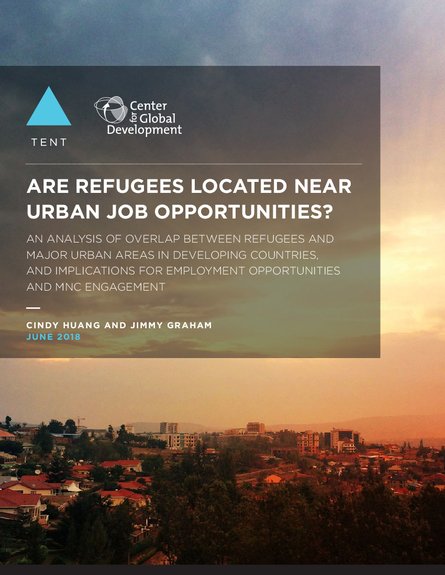An Analysis of Overlap Between Refugees and Major Urban Areas in Developing Countries, and Implications for Employment Opportunities and MNC Engagement

With over 22 million refugees around the world, displaced on average for over 10 years, policymakers are looking for more sustainable solutions to refugee crises. One promising approach is to expand economic opportunities for refugees in developing countries, which host 85 percent of the world’s refugees. In recent years, governments, donors, and private sector actors have been finding innovative ways to include refugees in labor markets, thus enabling them to become more self-reliant, reducing the cost of hosting refugees and creating economic benefits for hosts.
Multinational corporations (MNCs) are emerging as important partners in the push to expand refugee employment and entrepreneurship. As market leaders with global reach through hiring and supply chains, policy influencers, and innovators, MNCs have distinctive capacities for engagement that do not exist within the traditional refugee response community. MNCs are also well positioned to participate in broader jobs and livelihoods initiatives that support both refugees and the communities hosting refugees, which often struggle with high unemployment and limited economic opportunities.
To help demonstrate where MNCs, regional and local businesses, and other actors are best positioned to expand economic opportunities for refugees, we created an interactive tool to map the locations of refugees, and analyzed the extent to which refugees overlap with major urban areas in 31 of the 37 developing countries hosting at least 25,000 refugees. When refugees are located in urban areas, where economic activity and MNCs cluster, they have a much greater likelihood of being in close proximity to potential employers.
Links
Resource collections
- UN Habitat - Urban Response Collection
- Urban Response - Urban Crisis Preparedness and Risk Reduction
- Urban Response Collection - Community Engagement and Social Cohesion
- Urban Response Collection - Economic Recovery
- Urban Response Collection - Environment and Climate Change
- Urban Response Collection - Housing, Land and Property
- Urban Response Collection - Urban Crisis Response, Recovery and Reconstruction
- Urban Response Collection - Urban Resilience